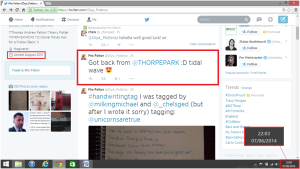The ‘art of teaching without teaching’ is an adaptation of Bruce Lee’s (a martial art’s instructor, philosopher and movie star) fighting style, Jeet Kune do, which is based around ‘the art of fighting without fighting’. What he meant by this is there is no set fighting style. Each fighter develops their own fighting style in the heat of the battle. I am a follower of Bruce Lee’s teachings not because I used to do Tae Kwon Do myself, but the same ideology can be applied to teaching as well…
By doing as little as possible, the child learns more and gets better results in the long run. The reason being is the child goes ‘through the struggle’ themself. Maths is a subject which requires critical thinking and the only way a student can develop this is when they struggle with their work. Don’t get me wrong, I am not saying there is no place for teachers. Teachers are very important but when they are teaching students, they should give them as little help as possible and build upwards from there.
This is the approach I take when I tutor students in my local area. I provide them with a problem and give them some time to think about it. I ask them to give me their thoughts. If they’re going wrong, I provide them with a hint to get them on the right lines. If they go off-track, I provide them with another hint. Then another, until they eventually solve the problem. It is during this process where the student develops their critical thinking.
At present, I feel teachers are giving away too much to their students. They are not allowing them to ‘think’ for themselves. There is a danger in doing this because the student becomes too reliant on the teacher. Whenever they come across a small problem, they automatically turn to their teachers for assistance without spending a few minutes trying to solve the problem on their own. As I said before, students need to develop critical thinking if they want to excel in maths at school.
Finland is a country which believe in the ‘art of teaching without teaching’ philosophy. Teachers in Finland spend only 4 hours in the classroom and they rarely give homework or exams to their students, yet they have one of the best education systems in Europe. I feel schools in England should follow suit. Not only will their results improve dramatically but teacher’s will have a less stressful lifestyle.
My GCSE maths revision program is all about ‘the art of teaching without teaching’ because I provide a student with the blueprint to achieve the best possible grade in their GCSE maths exam. They simply have to follow it. The majority of the work is carried out by the student and it’s during this program, where student’s go ‘through the struggle’ and learn the key ingredients for exam success.
So far, it’s had a 100% success rate. Every student that has followed my revision system, has boosted their grade considerably in maths. I highly recommend that you use it in your school. If you would like to use it in your school, please visit the home page: www.gcsemathsforschools.co.uk.
